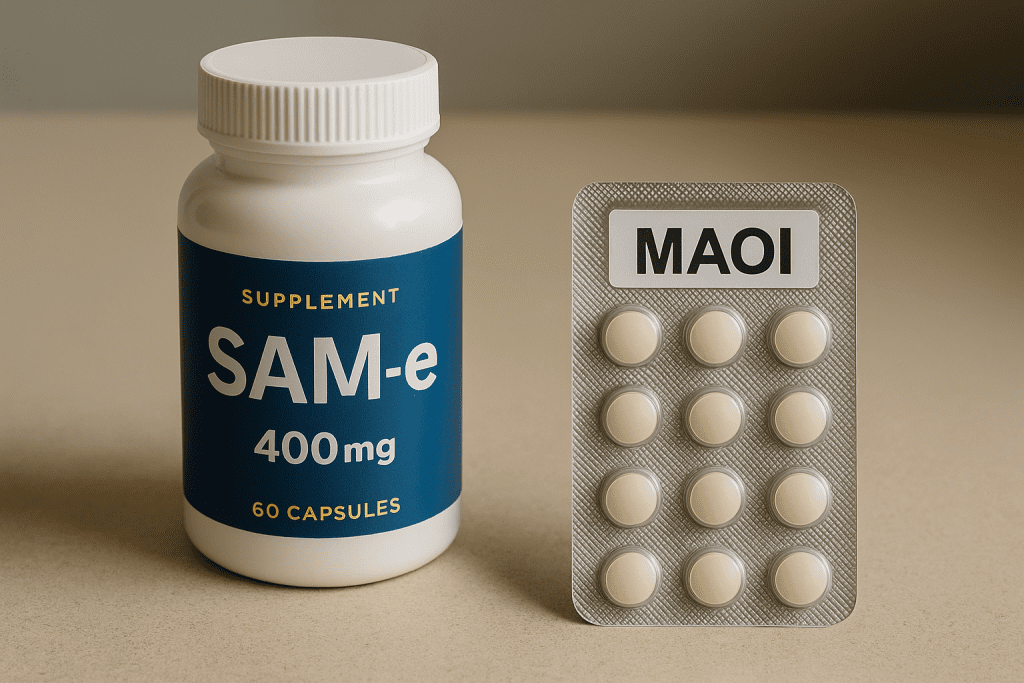Combining SAM-e with MAOIs can significantly alter brain chemistry – and not always for the better. While both are used in managing depression, this combination may raise the risk of anxiety, serotonin syndrome, and other severe side effects.
This article breaks down how SAM-e works, why it can conflict with MAOIs, the specific anxiety-related risks, and how to stay safe if you’re exploring supplement-based mood support.
Summary: SAM-e and MAOI Interaction at a Glance
| Key Point | Details |
|---|---|
| Risk Level | High – Interaction may cause serotonin syndrome and anxiety |
| Mechanism | Both raise serotonin, risking excess neurotransmitter levels |
| Symptoms | Agitation, rapid heartbeat, anxiety, muscle stiffness |
| Alternatives | Non-serotonergic supplements, doctor-monitored strategies |
| Advice | Never combine SAM-e with MAOIs without professional oversight |
How SAM-e Works and Why It Interacts With MAOIs
SAM-e (S-adenosylmethionine) is a naturally occurring compound involved in methylation, a key biochemical process that affects neurotransmitter synthesis. As a supplement, it boosts levels of serotonin, dopamine, and norepinephrine, making it appealing for depression support.
MAOIs, or Monoamine Oxidase Inhibitors, work differently: they block the enzyme monoamine oxidase, which normally breaks down these same neurotransmitters. By inhibiting this enzyme, MAOIs increase neurotransmitter availability.

When used together, SAM-e and MAOIs can amplify each other’s effects, raising serotonin to potentially dangerous levels. This interaction may lead to serotonin syndrome – a serious, sometimes fatal, condition characterized by overactivation of the nervous system.
According to the Mayo Clinic and Drugs.com, this combination should be avoided due to the synergistic spike in neurotransmitters.
Visual Tip: Think of it like two thermostats raising the same heat source – the risk isn’t just additive, it’s exponential.
Anxiety as a Key Side Effect: How Methylation May Heighten Risk
SAM-e’s impact on methylation pathways can influence mood regulation. While proper methylation supports mental balance, overstimulation can lead to racing thoughts, irritability, and anxiety.
This becomes especially concerning with MAOIs. Together, they may:
- Disrupt emotional regulation
- Increase catecholamine levels
- Trigger restlessness, panic, or insomnia
WebMD and the Mount Sinai Health System highlight anxiety as a common side effect when SAM-e is combined with serotonergic drugs.
Early signs of problematic interaction may include:
- Restlessness or jitteriness
- Racing heart or palpitations
- Feeling “wired” or overly alert
- Shaking or tremors
These signs may precede more serious symptoms of serotonin syndrome, such as confusion, muscle rigidity, or dangerously high body temperature.
If you’re exploring supplements while managing anxiety or depression, also review our article on Vitamin C and Adderall absorption interaction.
Clinical Evidence and Medical Warnings

Medical literature consistently advises against combining SAM-e with MAOIs.
- RxList classifies the interaction as “major,” warning of possible heart issues, anxiety, and serotonin overload.
- Drugs.com clearly states: “Do not use SAMe if you have used an MAO inhibitor in the past 14 days.”
- Memorial Sloan Kettering notes that SAM-e raises serotonin and can amplify antidepressant effects.
There’s a rare, more permissive take from The Carlat Report, which suggests cautious combination might be tolerated in some cases. But this view is far from mainstream.
Case reports show that even with SSRIs or tricyclics, SAM-e has triggered mood disturbances like mania, psychosis, and serotonin toxicity (PubMed).
Safer Alternatives and Supplement Strategies
If you’re looking for natural ways to support mood while taking MAOIs, consider these safer alternatives:
- Omega-3 fatty acids – low serotonin impact but evidence-backed mood benefits
- Rhodiola rosea – adaptogen with mild stimulation
- B vitamins – especially B6 and B12 for homocysteine and methylation balance
- Magnesium glycinate – calming and gentle, often deficient in anxiety
Always check for interactions and speak with a healthcare provider before adding any supplement.
Also relevant: Antidepressants and 5-HTP serotonin syndrome risk.
Pro Tip: Look for supplements labeled “non-serotonergic” or those with documented compatibility in clinical settings.
Final Recommendations: Protecting Mental Health While Supplementing
For individuals managing depression or anxiety, combining SAM-e and MAOIs is generally unsafe. Here’s what most professionals recommend:
- Avoid concurrent use unless specifically directed by a psychiatrist
- Maintain a 14-day washout period when switching between serotonergic treatments
- Monitor early symptoms like agitation or restlessness
- Disclose all supplements to your doctor, especially during medication changes
The risks of serotonin syndrome and anxiety spikes aren’t worth the gamble. There are other effective, safer paths to mood support with far less danger.

